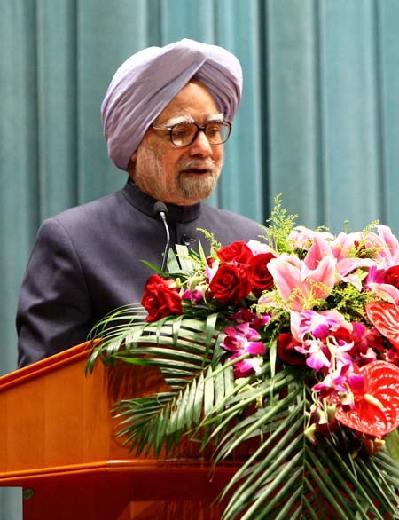

Economic links 'key to development of China and India'
India must further strengthen economic cooperation with China for the sake of the two major emerging economies' development, Indian Prime Minister Manmohan Singh said in Beijing on Thursday.
|
 |
|
Indian Prime Minister Manmohan Singh speaks on “India and China in the New Era” at the Central Party School of the Communist Party of China in Beijing on Thursday. ZHANG YONG / FOR CHINA DAILY |
Singh made the remarks in a speech at the Central Party School of the Communist Party of China.
Singh said he believes his audience at the school will play decisive roles in shaping China's development and will have a significant influence on the world.
"I believe that our two countries not only share a common destiny, but that we have unlimited possibilities for closer cooperation," he said. The most dynamic part of the two countries' relationship is in the economic sector, he added.
China has emerged as India's biggest trading partner, with two-way commerce totaling $67.83 billion in fiscal 2012, up from $2.1 billion a decade ago.
Singh singled out several areas in which he sees opportunities for more cooperation - infrastructure, agriculture, manufacturing, the environment, and food and energy security.
Sun Shihai, an Indian studies expert at the Chinese Academy of Social Sciences, said Singh's suggestions are practical.
"India can take advantage of Chinese manufacturing and agriculture, and I believe Chinese investment in those sectors can make a profit in the Indian market," Sun said.
China and India are the most populous developing countries and they both have a strong demand for energy and resources. Sun said they could cooperate more on overseas oil exploration, which could lower the amount they pay for imported oil.
"Premier Li Keqiang accompanied Singh on a visit to the Forbidden City yesterday (Wednesday), and the Indian prime minister delivered his speech at the Party school this morning. From these arrangements, we can see the Chinese government attaches great importance to Singh's trip," Sun said.
"It's clear that Beijing wants to strengthen the bilateral relationship and enhance mutual trust through these events."
|
Other party school speakers German Chancellor Angela Merkel talked to students from the Party School of the CPC Central Committee in Beijing on July 16, 2010. US Secretary-General Ban Ki-moon made remarks at the Roundtable on Global Governance and Harmonious Society at the school on Nov 3, 2010. Chilean President Sebastian Pinera delivered a keynote speech at the school on Nov 17, 2010. On May 17, 2011, European Council President Herman Van Rompuy gave a speech at the school, saying that China and the EU should work together as they adapt to the changing and increasingly globalized world. Then-Italian prime minister Mario Monti gave a speech at the school on March 31, 2012. Thai Prime Minister Yingluck Shinawatra said in a speech at the school on April 18, 2012, that the creation of partnership meets the common interests of both countries. Singaporean Prime Minister Lee Hsien Loong said on Sept 6, 2012 in a speech at the school that all ASEAN members are expected to expand cooperation with China. (He last spoke there in October 2005.) Israeli Prime Minister Benjamin Netanyahu gave a speech at the school on May 9, 2013. Venezuelan President Nicolas Maduro joined a symposium at the school and shared his opinions on the different forms of socialism in Venezuela and China on Sept 23, 2013. |
Hu Shisheng, director of the Institute of South and Southeast Asian and Oceanian Studies at the China Institutes of Contemporary International Relations, said cooperation in infrastructure could be a fundamental contributor to India's economy.
"Infrastructure is one of the major challenges that India's economy is facing. Because of its less-developed public facilities, most foreign direct investment to India poured into the Indian stock market, instead of industrial sectors," Hu said.
India is one of the largest international markets for Chinese overseas construction projects, he added.
Although Singh said that maintaining peace and stability on the two countries' border is still a major challenge to Sino-Indian relations, he stressed that cooperation between them far outweighs their differences.
"The stability in our relationship has created the basic conditions for our two countries to exploit the opportunities created by our economic growth and opening," Singh said.
"India and China cannot be contained, and our recent history is testimony to this. Nor should we seek to contain others," Singh said. The world is large enough to accommodate the development aspirations of both India and China, he added.
zhaoyanrong@chinadaily.com.cn